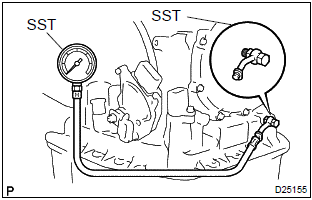Toyota Corolla (E120): Hydraulic test
1. Perform hydraulic test
- Measure the line pressure.
Notice
:
- Do the test at normal operation atf temperature 50 to 80 °c (122 to 176 °f).
- The line pressure test should always be carried out in pairs. One technician should observe the conditions of wheels or wheel stopper outside the vehicle while the other is doing the test.
- Be careful to prevent sst’s hose from interfering with the exhaust pipe.

- Warm up the atf.
- Remove the test plug on the transaxle case front left
side and connect sst.
Sst 09992–00095 (09992–00231, 09992–00271)
- fully apply the parking brake and chock the 4 wheels.
- Connect an obd ii scan tool or hand–held tester to the dlc3.
- Start the engine and check the idling speed.
- Keep your left foot pressed firmly on the brake pedal and shift into the d position.
- Measure the line pressure when the engine is idling.
- Depress the accelerator pedal all the way down.
Quickly read the highest line pressure when the engine speed reaches the stall speed.
- Do the test in the r position in the same way.
Specified line pressure:

Evaluation:
|
Problem |
Possible cause |
| If the measured values at all positions are higher |
|
| If the measured values at all positions are lower |
|
| If pressure is low in the d position only |
|
| If pressure is low in the r position only |
|
Other materials:
Radio receiver assy
Replacement
Рint: components:
1. Remove floor shift shift lever knob sub–assy (m/t transaxle)
2. Remove console panel upper
3. Remove heater control knob
4. Remove instrument cluster finish panel
5. Remove instrument cluster finish panel sub–assy
center
Remove the 4 screws.
& ...
Circuit description
The side squib (lh) circuit consists of the airbag sensor assy center and
front seat airbag assy (lh).
It causes the srs to deploy when the srs deployment conditions are satisfied.
Dtc b0115/47 is recorded when a short is detected in the side squib (lh)
circuit.
Wiring diagram
...
Correct driving posture
1 Adjust the angle of the seatback so that you are sitting straight up and so
that you do not have to lean forward to steer.
2 Adjust the seat so that you can depress the pedals fully and so that your arms
bend slightly at the elbow when gripping the steering wheel.
3 Lock the head restraint ...


